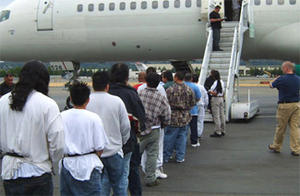ImmigrationImmigration advocates say CBP uses "expedited removal" to deport asylum seekers
A new complaint to the DHS Office of Civil Rights and Civil Liberties charge sthat U.S. Customs and Border Protection(CBP) agents routinely ignore asylum seekers’ claim of fear of prosecution in their homeland, a claim which could grant them asylum in the United States. The complaint further states that CBP officers are increasingly using “expedited removal” to deport illegal immigrants. Unlike conventional deportation, expedited removal occurs outside of the judicial process. The number of expedited removal orders more than doubled in less than a decade from 72,911 in 2005 to 193,092 in 2013.

Deportees boarding plane for trip home // Source: 81law.com
A new complaint to the DHS Office of Civil Rights and Civil Liberties, filed by immigration advocates led by the National Immigrant Justice Center, says that U.S. Customs and Border Protection (CBP) agents routinely ignore asylum seekers’ claim of fear of prosecution in their homeland, a claim which could grant them asylum in the United States. The complaint, filed last Thursday, said border agents on the U.S.-Mexico border “frequently flout federal law by failing to ask asylum seekers whether they fear persecution in their home countries, and intimidating and ignoring individuals who do express fear.”
According to Newsweek, the complaint further states that CBP officers are increasingly using “expedited removal” to deport illegal immigrants. Unlike conventional deportation, expedited removal occurs outside of the judicial process. The number of expedited removal orders more than doubled in less than a decade from 72,911 in 2005 to 193,092 in 2013. Forty-four percent of overall deportations are now via expedited removals, with 98 percent of affect immigrants originating from Mexico, Guatemala, El Salvador, and Honduras.
Federal law requires border agents to refer illegal immigrants expressing “fear of persecution” in their homeland to U.S. Citizenship and Immigration Services (USCIS), even if they are subject to expedited removal. The agency will then conduct a “credible fear interview,” which allows the immigrants to make the case to asylum officers that they have been persecuted or face persecution due to “race, religion, nationality, membership in a particular social group, or political opinion if returned” to their country. If an asylum officer agrees that there is a “credible fear,” the petitioner will be referred to an immigration judge. If an asylum officer does not determine “credible fear,” the petitioner may still request an interview with an immigration judge. The complaint accuses border agents of failing to follow these screening procedures.
In response to the complaint, a CBP official wrote to Newsweek that “agents and officers receive training on the expedited removal process and how to identify the applicable charges, recognize the conditions making an alien amenable to expedited removal, and how to properly process. This includes recognizing circumstances that require a referral to USCIS for a credible fear interview.”
“That said, DHS takes allegations of this nature seriously and will investigate and if warranted take corrective action,” the official added.
